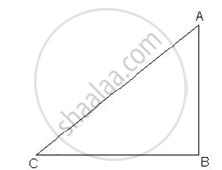Advertisements
Advertisements
Question
Prove the following identities, where the angles involved are acute angles for which the expressions are defined:
(sin A + cosec A)2 + (cos A + sec A)2 = 7 + tan2 A + cot2 A
Solution
(sin A + cosec A)2 + (cos A + sec A)2 = 7 + tan2 A + cot2 A
L.H.S = (sin A + cosec A)2 + (cos A + sec A)2
= sin2A + cosec2A + 2sinA cosecA + cos2A + sec2A + 2cosA secA
= (sin2A + cos2A) + (cosec2A + sec2A) + 2sinA`(1/sinA)`+ 2cosA`(1/cosA)`
= (1) + (1 + cot2A + 1 + tan2A) + (2) + (2)
= 7 + tan2A + cot2A
= R.H.S
APPEARS IN
RELATED QUESTIONS
In the below given figure, a tower AB is 20 m high and BC, its shadow on the ground, is 20√3 m long. Find the sun’s altitude.

Evaluate without using trigonometric tables,
`sin^2 28^@ + sin^2 62^@ + tan^2 38^@ - cot^2 52^@ + 1/4 sec^2 30^@`
Without using trigonometrical tables, evaluate:
`cosec^2 57^circ - tan^2 33^circ + cos 44^circ cosec 46^circ - sqrt(2) cos 45^circ - tan^2 60^circ`
Prove the following identities, where the angles involved are acute angles for which the expressions are defined:
(cosec A - sin A) (sec A - cos A) = `1/(tanA+cotA)`
[Hint: Simplify LHS and RHS separately.]
Without using trigonometric tables, evaluate :
`sec 11^circ/("cosec" 79^circ)`
Without using trigonometric tables, prove that:
cos 81° − sin 9° = 0
Without using trigonometric tables, prove that:
cosec 80° − sec 10° = 0
Without using trigonometric tables, prove that:
cos275° + cos215° = 1
Without using trigonometric tables, prove that:
tan266° − cot224° = 0
Without using trigonometric tables, prove that:
sin53° cos37° + cos53° sin37° = 1
Prove that:
`cos 80^circ/(sin 10^circ) + cos 59^circ "cosec" 31^circ = 2`
Prove that:
`(2 "sin" 68^circ)/(cos 10^circ )- (2 cot 15^circ)/(5 tan 75^circ) = ((3 tan 45^circ t an 20^circ tan 40^circ tan 50^circ tan 70^circ)) /5= 1`
Prove that:
`sin 18^circ/(cos 72^circ )+ sqrt(3)(tan 10^circ tan 30^circ tan 40^circ tan50^circ tan 80^circ) `
Prove that:
sin θ cos (90° - θ ) + sin (90° - θ) cos θ = 1
Prove that:
\[\frac{\sin\theta}{\cos(90° - \theta)} + \frac{\cos\theta}{\sin(90° - \theta)} = 2\]
Prove that:
cot12° cot38° cot52° cot60° cot78° = \[\frac{1}{\sqrt{3}}\]
Prove that:
cos1° cos2° cos3° ... cos180° = 0
If A, B and C are the angles of a ΔABC, prove that tan `((C + "A")/2) = cot B/2`
If sin 3 A = cos (A − 26°), where 3 A is an acute angle, find the value of A.
Prove that `(sin "A" - cos "A" + 1)/(sin "A" + cos "A" - 1) = 1/(sec "A" - tan "A")`
A man in a boat rowing away from a lighthouse 100 m high takes 2 minutes to change the angle of elevation of the top of the lighthouse from 60° to 30°. Find the speed of the boat in metres per minute [Use `sqrt3` = 1.732]
Prove the following:
`1/(1+sin^2theta) + 1/(1+cos^2theta) + 1/(1+sec^2theta) + 1/(1+cosec^2theta) = 2`
Given that `tan (θ_1 + θ_2) = (tan θ_1 + tan θ_2)/(1 - tan θ_1 tan θ_2)` Find (θ1 + θ2) when tan θ1 = `1/2 and tan θ_2 = 1/3`.
Without using trigonometric tables, find the value of (sin 72° + cos 18°)(sin 72° - cos 18°).
Without using tables evaluate: `(2tan 53°)/(cot 37°) - (cot 80°)/(tan 10°)`.
Using trigonometric table evaluate the following:
tan 25°45' + cot 45°25'.
Using trigonometric table evaluate the following:
sin 64°42' + cos 42°20'
Using trigonometric table evaluate the following:
tan 78°55' - tan 55°18'
`(sin 40° + cos 50°)/(tan 38°20')`
`(sin 20°50' + tan 67°40')/(cos 32°20' - sin 15°10')`
Given that sin θ = `a/b` then cos θ is equal to ______.
The maximum value of `1/(cosec alpha)` is ______.
Prove that:
`(cos^2 "A")/(cos "A" - sin "A") + (sin "A")/(1 - cot "A")` = sin A + cos A
